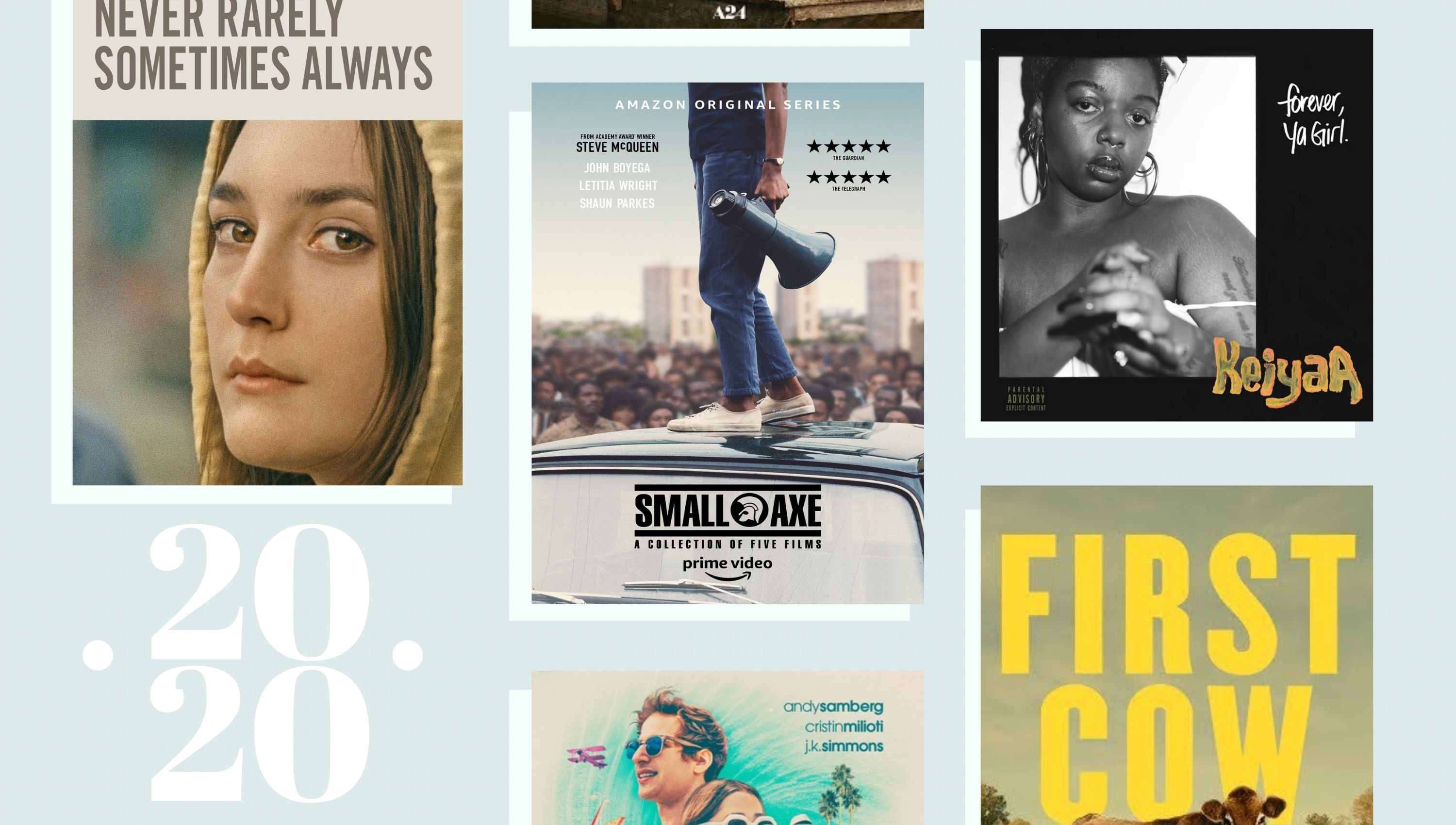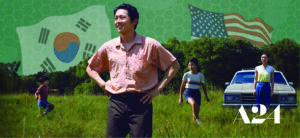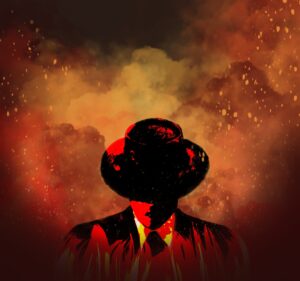Most people measure a year with a calendar, but for movie and music buffs, a year is defined by its films and albums. With the COVID-19 pandemic creating a ripple effect of delays in the entertainment industry, the Grammys and the Academy Awards were pushed back to March and April, respectively. Time makes less and less sense during quarantine, so now seems as good a time as any to celebrate some of our favorites that flew under the radar in 2020.
Movies:
First Cow
“The bird a nest, the spider a web, man friendship.” Director Kelly Reichardt could not have possibly known how much this William Blake quote, seen in the epigraph during the opening credits, would resonate with audiences during the long, isolating year that was 2020. First Cow (2019) follows Cookie Figowitz (John Magaro), a quiet Jewish baker, and King-Lu (Orion Lee), a Chinese immigrant, who decide to go into business together selling baked goods to fur traders in 19th-century Oregon. Reichardt’s film turns everything we expect from a Western on its head. Her depiction of the American frontier is not hypermasculine and violent, but rather diverse, subdued, and, above all, lonely. The comfort that outsiders Cookie and King-Lu find in each other in this bleak environment is all too relatable for viewers who have spent endless months isolated from friends and family during the pandemic.
First Cow unfortunately got no love from the Academy this year, but it recently received praise from an unlikely source—Justice League director Zack Snyder. In an interview with The New York Times, Snyder hilariously proposed a double feature of First Cow with his four-hour superhero director’s cut, given that both films share an unorthodox 4:3 aspect ratio. The jury is still out on the effectiveness of Snyder’s choice, but Reichardt’s use of this square-shaped frame further challenges the classical Western genre by toning down what is typically an epic, sweeping scale to one of intimacy and claustrophobia. Unfolding at a transfixing, slow pace, First Cow is one of the most gentle, human films of last year and is worthy of “Snyder Cut” levels of attention.
— Danielle Guida
The Small Axe Anthology
What Small Axe (2020) is depends on who you ask. Here’s what we know for sure: It’s a five-part anthology directed by Steve McQueen, capturing West Indian culture and life in London from the ’60s through the ’80s. All five chapters clock in at over an hour and focus on their own individual stories—some historical and some fictional.
Because Small Axe was released weekly by Amazon Prime, which formatted the anthology like its other TV series, the narrative surrounding the rollout became mired in semantic discourse about how it should be classified: Television? Film? A hybrid of the two? And does it even matter? But this weakness of form, if it can even be called that, is also Small Axe’s strength. Cinematic representation is in a period of growing pains—Black stories are gaining funding and critical attention, but often the projects that center suffering are what triumph, again and again. Small Axe, by contrast, doesn’t rely on this fetishization of Black pain.
Small Axe is by definition a collection, differing from film to film in perspective and intent. The anthology never shies away from portraying racism and the violence of police brutality, but it has the breathing room to explore Black life in a greater totality, apart from systems of oppression: from food and community (Mangrove), to dance, nightlife, and love (Lovers Rock). With a dynamism of cinematography, editing, and performance, the Small Axe anthology deserves a closer look—no matter how you want to categorize it.
— Abby Webster
Never Rarely Sometimes Always
At first glance, Eliza Hittman’s Never Rarely Sometimes Always (2020) may seem like a standard coming-of-age story: Autumn (Sidney Flanigan), a pregnant 17-year-old, travels to New York with her cousin Skylar (Talia Ryder) after learning she cannot get an abortion in Pennsylvania without parental consent. Though the plot may seem simple, the film surprises viewers through what Hittman chooses to reveal and withhold. The film does not concern itself with how Autumn got into this situation or what she will decide to do; her decision is final from the start and the story is solely about where she goes from there.
Hittman’s directorial style can best be described as naturalistic, but that is not to say that her craft is not apparent. Instead of shaky hand-held camera movements, Hittman builds intimacy with long, steady closeups that dwell on the faces of the two young actors—both in their first film roles—that communicate their thoughts through muted facial expressions rather than through melodramatic dialogue.
The sequence that gives Never Rarely Sometimes Always its title stands out as one of the most powerful movie moments of the last year. As a Planned Parenthood doctor asks Autumn a standard set of procedural questions, the viewers learn just enough about Autumn’s past trauma without having the details spelled out for them. Never Rarely Sometimes Always did not make waves on the awards circuit, but it speaks subtle volumes to how women in this country get lost in a bureaucratic healthcare system that too often puts them in danger despite being meant to help them.
— Danielle Guida
Palm Springs
Pool floaties, dinosaurs, and infinite time loops—oh my! In a bleak year, Palm Springs (2020) was a whimsical, low-stakes breath of fresh air. In the SoCal desert, Nyles (Andy Samberg) stumbles upon a glowing cave vortex and is doomed to live the same 24 hours over and over. It’s the day of a sort-of girlfriend’s friend’s wedding at a Palm Springs resort; the sun is shining, and drinks are flowing from the open bar. Overall, perpetual Nov. 9 isn’t a bad life. Nyles seems perfectly happy to kick his feet up on an inflatable pizza slice for the rest of eternity.
The Groundhog Day (1993) formula is simple: Create an unchanging environment, and the character will, themselves, be forced to change. Palm Springs flips the trope on its head. Nyles, by himself, embraces nihilism, carelessly ticking away the infinite present. But, after a post-wedding hookup gone wrong—a wily J.K. Simmons emerges out of the brush in camouflage gear and shoots Nyles with a hunting bow—the bride’s sister Sarah (Cristin Milioti) is drawn into the repeating day as well. The two embark on their journey of shared immortality with dark humor, great chemistry, hallucinatory trips, and family revelations.
Though nominated for Best Picture, Musical or Comedy at the 2021 Golden Globes (with the undeserving likes of The Prom (2020) and Music (2021)), Palm Springs didn’t seem to make much of a splash in online circles, sadly. Personally, I can’t think of a better antidote to quarantine blues than a sweet, inventive, 90-minute comedy about being trapped, together.
—Abby Webster
Host
In early 2021, star-studded “quarantine films” like Malcolm & Marie (2021) and Locked Down (2021) made their way to Netflix, HBO Max, and other streaming services after being written and shot entirely during the COVID-19 crisis. The real-world conditions of the pandemic are impossible to forget as both films focus on just two characters predominantly in one location. The best of this (hopefully) short-lived genre of quarantine films was one of the smallest and also one of the first. Rob Savage’s Host (2020) came out in July, early into lockdown when people were still adjusting to their new lifestyles. This low-budget found-footage horror film takes place entirely on a computer screen—in the same vein as Unfriended (2014) and Searching (2018). Savage’s film centers on a group of bored friends in quarantine performing a séance over Zoom. What could go wrong?
Anyone with Zoom fatigue can appreciate Savage’s use of every detail on the video-calling platform, from the chat window to the personalized names in boxes. In addition to having Paranormal Activity-caliber jump scares, Host ingeniously sneaks in commentary about people’s growing social anxiety while attempting to preserve some normality in their social lives. The class consciousness that comes with the preparedness of your Zoom background and the ability to cohabitate with a partner are as integral to Host as the ominous spirits and ghosts. At just 56 minutes long (roughly the duration of a free Zoom call) and found only on the horror streaming service Shudder, Host is not the type of movie to garner mainstream success but is certainly the film I most associate with 2020.
— Danielle Guida
Albums:
KeiyaA, Forever, Ya Girl
If you’re anything like me, and every night before bed you say a short prayer that tomorrow SZA will release her Ctrl follow-up, this album is for you. Recorded over the course of four years, singer, writer, instrumentalist, and producer KeiyaA’s debut LP Forever, Ya Girl is a fresh, exquisite example of alternative R&B brilliance. With the raw authenticity of SZA, the ingenious ear of FKA Twigs, the ethereal soul of Solange, and her own unique sound that builds on decades of anger and frustration and suffering, KeiyaA somehow finds resilience in 2020 of all years. While the album carries somber overtones, she does not dwell on her pain, focusing instead on protecting and bettering herself moving forward. It is her commitment to growth that turns an album about being hurt and upset and flawed into something utterly joyous. On the lead single, “Do Yourself a Favor,” three different KeiyaA’s sing in unison with one high, one low, one distorted in a Frank Ocean-like autotune: “Now I’m alone, I’m feeling free / Freer than a butterfly, flying high now.” This technique of vocal layering is a trope in the album—one that consistently adds complexity and nuance. On another standout, “I! Gits! Weary!,” we see KeiyaA’s desires for privacy and tranquility exemplified through her multiple vocal tracks: “Is it my spirit crying, or is it the psilocybin? / ‘Cause I can feel it on the regular.” One voice, potent but scarred, evokes pain and frustration, while her softer, lower register sing-talks underneath, conveying exhaustion and fatigue.
Forever, Ya Girl is a battle between the two different facets of KeiyaA—on one side her wants and on the other, her needs. Many lyrics can be read as directed at the political system or at a lover: “You cannot access me with a check / Maybe you need to reflect so we can both progress.” However, the thesis statement of the album comes in “F.w.u.,” when she asserts, “Open my mouth and let me talk my shit.” This perfectly encapsulates the album: KeiyaA talking her distinctive shit—albeit in a poetic, politically conscious manner. It is infuriating that this album does not receive more attention, but because KeiyaA did not have to compromise with or conform to any record executive’s opinion, perhaps Forever, Ya Girl’s authenticity, originality, and poetic mastery were only possible outside the confines of a traditional trajectory.
— John Szieff
Amaarae, THE ANGEL YOU DON’T KNOW
Born in NYC and raised in both Ghana and the U.S., singer and rapper Amaarae defies a singular identity in the same way her debut album eludes genre. The LP is a musical odyssey: The 26-year-old sings and raps, bouncing from Southern flows (“FANCY”) and afropop (“JUMPING SHIP”) to sultry R&B (“FEEL A WAY”) and dancehall (“LEAVE ME ALONE”).
An activist as much as an artist, Amaarae fights for LGBTQ+ and women’s rights by complicating expected notions of sexuality, particularly for a Black woman. In “CÉLINE,” she sings a love song to a girl: “Ah! Céline / You don’t know just what you do to me / Any time I see you it’s in my dreams / I’m just tryna make you mon ami.” Then, much in the way RuPaul’s Drag Race objectifies the male body with the Pit Crew, Amaarae flips the male gaze on its head by casually reducing men to just their bodies. On “JUMPING SHIP,” she whispers, “Hottie, you’re an item I want to pay for,” ironically on a track with two male features. THE ANGEL YOU DON’T KNOW is full of gags. On the Tierra Whack-esque “HELLZ ANGEL,” Amaarae casually spits, “I don’t make songs / Bitch, I make memories,” with all the swagger and punch of a rapper, only for her to follow with “I don’t like thongs, ‘cause they ride up in jeans.”
The album is as fun as it is impressive, even during its more melancholy moments. “DAZED AND ABUSED IN BEVERLY HILLS” is an experimental gem and perfect driving-home-late-at-night minute-long sing along. “SAD, U BROKE MY HEART” boasts a captivating, ass-shaking rhythm while the lyrics elicit tears. Amaarae and her music embody duality, between Africa and America, between homosexuality and heterosexuality, between serious and silly.
THE ANGEL YOU DON’T KNOW is escapism at its best, and Amaarae at her most exuberant. On the lead single “LEAVE ME ALONE,” she states, “All the diamonds in the world can’t outshine me,” and she’s right. When she dropped this track, she tweeted that it was made “for the young OGs to smoke and be happy to.” My God, did she deliver.
— John Szieff




